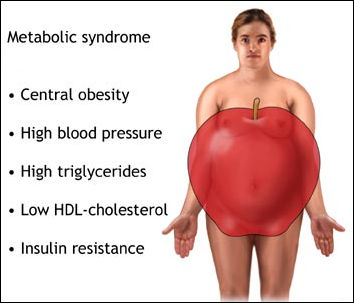Chronic
Hepatitis C Patients with Metabolic Syndrome Are at Greater Risk of Death By
Liz Highleyman
Obesity,
insulin resistance, and abnormal blood lipid levels increase the risk of death
for people with chronic hepatitis C virus (HCV)
infection, according to a study presented at the 44th
Annual Meeting of the European Association for the Study of the Liver (EASL 2009)
last month in Copenhagen. 
A
growing body of evidence indicates that the metabolic syndrome -- a collection
of manifestations including high body mass index (BMI), altered glucose and fat
metabolism, and hypertension (high blood pressure) -- is interrelated with conditions
including cardiovascular disease, HIV disease, and liver disease, including chronic
hepatitis C. Among hepatitis C patients, obesity and diabetes have been linked
to both accelerated fibrosis
progression and poorer response to interferon-based
therapy.
Zobair Younossi and colleagues from Inova Health System analyzed
the relationship between metabolic syndrome and hepatitis C outcomes using data
from the Third National Health and Nutrition Examination Survey (NHANES III, conducted
1988-1994) and associated Linked Mortality Files containing follow-up information
on causes of death through 2000.
A total of 264 people with hepatitis
C (HCV RNA positive) were compared to about 13,000 people without liver disease.
Individuals with liver disease or risk factors unrelated to HCV -- such as hepatitis
B, heavy alcohol use, and non-alcoholic fatty liver disease -- were excluded.
People with hepatitis C were much more likely to smoke tobacco than those in the
control group (64% vs 27%).
Results
 Hepatitis C patients were significantly more likely than control subjects to have
insulin resistance, defined as HOMA score > 3 (37% vs 23%; P < 0.0001).
Hepatitis C patients were significantly more likely than control subjects to have
insulin resistance, defined as HOMA score > 3 (37% vs 23%; P < 0.0001).
 The hepatitis C group also a higher rate of diabetes mellitus than the control
group (9% vs 6%; P = 0.0885).
The hepatitis C group also a higher rate of diabetes mellitus than the control
group (9% vs 6%; P = 0.0885).
 Conversely, people with hepatitis C had slightly lower rates of hypertension and
obesity.
Conversely, people with hepatitis C had slightly lower rates of hypertension and
obesity.
 In comparison with HCV negative individuals, the HCV positive group had:
In comparison with HCV negative individuals, the HCV positive group had:
 Higher overall mortality (adjusted hazard ration [AHR] 2.80);
Higher overall mortality (adjusted hazard ration [AHR] 2.80);
 Higher liver-related mortality (AHR 17.96);
Higher liver-related mortality (AHR 17.96);
 Higher diabetes-related mortality (AHR 18.55);
Higher diabetes-related mortality (AHR 18.55);
 Higher mortality related to solid organ malignancies (AHR 1.60).
Higher mortality related to solid organ malignancies (AHR 1.60).
 Among the hepatitis C patients, the top 3 predictors of liver-related mortality
were higher BMI, insulin resistance, and elevated serum cholesterol.
Among the hepatitis C patients, the top 3 predictors of liver-related mortality
were higher BMI, insulin resistance, and elevated serum cholesterol.
 In a multivariate analysis, increased overall or all-cause mortality in the hepatitis
C group was associated with components of the metabolic syndrome:
In a multivariate analysis, increased overall or all-cause mortality in the hepatitis
C group was associated with components of the metabolic syndrome:
 Type 2 diabetes: AHR 2.14;
Type 2 diabetes: AHR 2.14;
 Hypertension: AHR 1.41;
Hypertension: AHR 1.41;
 Higher BMI: AHR 1.05.
Higher BMI: AHR 1.05.
 Increased liver-related mortality in this group was significantly associated with
2 of the same factors:
Increased liver-related mortality in this group was significantly associated with
2 of the same factors:
 Hypertension: AHR 3.751;
Hypertension: AHR 3.751;
 Higher BMI: AHR 1.275.
Higher BMI: AHR 1.275.
Based
on these findings, the researchers concluded, "Components of metabolic syndrome
are associated with overall and liver-related mortality in HCV infected patients."
Due
to lack of retrospective data, this study did not include biopsy findings to identify
the extent of liver damage, nor information on HCV
genotype, which is known to play a role in liver
steatosis (fat accumulation in liver cells), which itself is increasingly
recognized as a component of the metabolic syndrome.
Center for Liver
Diseases and Center for Integrated Research, Inova Fairfax Hospital, Inova Health
System, Falls Church, VA.
5/08/09 Reference
N
Rafiq, M Stepanova, B Lam, and Z Younossi. Type 2 diabetes (DM), obesity and hypertension
(HTN) are associated with mortality in hepatitis C (HCV) patients. 44th Annual
Meeting of the European Association for the Study of the Liver (EASL 2009). Copenhagen,
Denmark. April 22-26, 2009. EASL
2009 MAIN PAGE

EASL
2009 Conference Coverage
HIV and Hepatitis.com Highlights from EASL 2009
15th
Conference on Retroviruses and Opportunistic Infections (CROI 2009)
Coverage
by HIV and Hepatitis.com - February 8 - 11, 2009, Montreal
HIV and AIDS Treatment
News, Experimental News, FDA-approved News Highlights
of the 15th Conference on Retroviruses and Opportunistic Infections (CROI 2009)
- Coverage by HIV and Hepatitis.com, February 8 - 11, 2009, Montreal
|
|